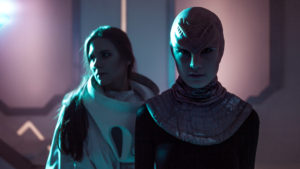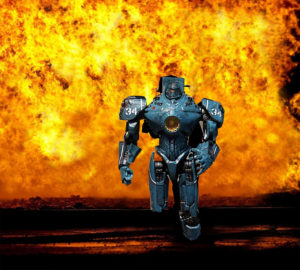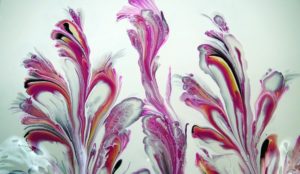Readers, this week I’m continuing my discussion with two ladies, Nipi and Oba, from the planet Dudra.

Oba, can you tell me what your family life was like there? Did you have siblings?
O: I have a sister and a brother who still live on Ka’Ran. My brother is a priest in the Simbat Temple in the underwater city of Bai’ala’ti, where I grew up. My sister is married and has two children of her own. I was the youngest of the family.
S: What kinds of things did you enjoy as a child?
O: I was fascinated by our planet’s aquatic life, so I spent as much time as allowed near the edges of the city. I think you can see from the photo that parts of the exterior structure are clear, and it is quite common for the sea creatures to swim right up to it. I think sometimes they enjoy watching us as much as we enjoy watching them.
S: I’m surprised you didn’t become a marine biologist.
O: As a child, that is what I dreamed of. But as I got older, I became more aware of the fragile nature of the ecosystems on our planet, and I realized if we didn’t work to preserve them, some of our exquisite life forms might be lost to us forever. There were several endangered species when I was a child, including one of my favorites, a very colorful animal called a vinchat—which would translate as sea fingers. I decided to dedicate my life to preserving our planet, and I’m  happy to say, we’ve made tremendous progress in that regard. Ka’Ran has a very stable ecosystem, and even our High Order has embraced the need to preserve it.
happy to say, we’ve made tremendous progress in that regard. Ka’Ran has a very stable ecosystem, and even our High Order has embraced the need to preserve it.
S: I wish I could visit Ka’Ran. It sounds so beautiful.
O: It is. I just wish the people could open their minds a little more.
S: I understand. Nipi, what was your family like? What did you enjoy as a child?
N: Our family structure is much different from Ka’Ran. Men and women do not marry for life. A couple may stay together until a child is four or five, but often their relationship is more temporary. Children are traditionally raised by their mother. Our planet is divided into ten political regions, what you would identify as countries, and each region provides for the welfare of a child until he or she reaches adulthood. Our children move into residential schools at the age of five. The parents visit on special days, and the children have vacation periods when they may go home or take trips sponsored by their school.
S: Did you enjoy school?
N: Most of the time. I liked most of my teachers, and most of us grow very close to our—I suppose you would call them nannies—in our schools, though they are much more like foster parents. They are people specifically selected for those positions who love caring for children.
S: What were your favorite subjects?
N: I always loved the arts, painting, music, and dance. I would have liked to be a professional artist, but my teachers encouraged me to pursue something that would be a more lucrative and dependable career. I was good at science, and that’s how I ended up as a robotics engineer. At least I am designing, creating something, and that aspect of the work is  rewarding. As it turned out, their advice was wise, since I make a good, dependable income. The robots I design are used as artificial workers for maintenance and building, fighting intense fires, and cleaning up bio and chemical hazards where use of protective gear is too cumbersome or dangerous for live workers.
rewarding. As it turned out, their advice was wise, since I make a good, dependable income. The robots I design are used as artificial workers for maintenance and building, fighting intense fires, and cleaning up bio and chemical hazards where use of protective gear is too cumbersome or dangerous for live workers.
S: Are there a lot of that type of accident?
N: Yes. And not all are accidents, though the companies always insist they are. Since there is an unending supply of robotic workers, there is little incentive to be cautious. There is a political faction, of which Oba and I are members, trying to bring about change, but we continue to meet major resistance. I can not understand how anyone, even the heads of the companies, can want to live like this.
 O: It is because they do not live like this. They have elegant homes on other planets, or live in opulent orbiting colonies.
O: It is because they do not live like this. They have elegant homes on other planets, or live in opulent orbiting colonies.
S: The managers at some level have to be there. You’d think they would push for change.
N: They are well paid to put up with the inconvenience, and have the money and time to travel elsewhere for vacations. Besides, protest would get them fired, and no other company would hire them, so the managers won’t risk it.
Our planetary government is trying to repair some of the damage that has been done, but they let it go on for far too long. Now, reversing it is going to be a long process.
S: I worry that our planet will make the same mistakes. We talk about preserving the environment, but thus far, very little is being done. Like Dudra, the large corporations here are powerful and unwilling to take steps that will reduce their profit margins.
N: Greed always gets in the way of social conscience.
S: What do the two of you do now for recreation?
N: We travel as often as we have time. We also attend concerts and dance productions. Fortunately Dudra is not devoid of culture.
O: And I have encouraged Nipi to continue with her art. She is an exquisite artist. These are some of her pieces.

 S: Oh, these are beautiful. Since you two have such love of visual and performance arts, it’s a shame the two of you can’t live on Ka’Ran together. It sounds like it would be a good fit for both of you. How long has that regime been in power? Do you think there is any chance the religious climate will change at some point?
S: Oh, these are beautiful. Since you two have such love of visual and performance arts, it’s a shame the two of you can’t live on Ka’Ran together. It sounds like it would be a good fit for both of you. How long has that regime been in power? Do you think there is any chance the religious climate will change at some point?
O: In ancient times, we had multiple religions in different regions of the world. However, Ka’Re’Idinism gained dominance approximately five hundred of our solar cycles ago.
N: It is difficult to overcome an organization which rules with brutal suppression of dissent.
S: That is always difficult to overcome. I hope that sometime soon the two of you will find a better living situation.
N: We will continue to seek a better future. Thank you for talking to us.
S: Thank you. I’ve learned a lot from you.
Readers, next week I’ll be talking Juradaa, who lives and works on a space station. You won’t want to miss this one!
